ole-play training has been around for decades: in sales, in customer service, in medical simulations, in leadership training. The basic idea: learners practise real-life or simulated conversations (with a coach, facilitator, or peer) in a safe environment so they build confidence, experiment, make mistakes, get feedback, and thereby transfer skills to the real field.
Some key milestones:
- In classical instructor-led training, facilitators would role-play the customer/learner playing the rep, then debrief. This works, but is labor-intensive, scheduling is hard, and quality varies.
- With e-learning and simulation tools, we began to build scripted branch-logic scenarios (choose your answer, see what happens). Better scale, but still static.
- More recently, role-play moved to digital avatars, video scenarios, and interactive simulation (for example, medical simulation of patient interactions).
- And now: AI-driven role-play, where the conversational partner is powered by an AI, scenario design is customized, feedback is instant, scalable, and 24/7.
Why the shift? Because organizations want more scalable, consistent, on-demand training: no more waiting for a role-play slot with a facilitator, no more variation in quality, and data to track progress.
So while role-play is nothing new, the AI-powered variant is relatively recent and rapidly expanding. Role-play training evolved from live → scripted digital → AI-driven. Organizations that adopt the latest generation are gaining scale, speed, and data advantages.
Technical Under-The-Hood: How AI Role-Play Works
Let’s dig into the technical mechanics of AI-role-play training software.
Scenario generation
AI role-play tools allow creators to define a use case (e.g., “cold-call discovery”, “lead objection on pricing”, “doctor patient leadership conversation”). The system uses generative AI (large language models, conversation models) to build a scenario, in other words, branching logic, from a single prompt or template.
Conversational AI interaction
During a role-play session, the learner interacts with an AI avatar or virtual persona. The system uses natural language processing (NLP) to interpret the learner’s responses, drive the conversation, pose questions/challenges, simulate realistic behaviors, and handle various turns of conversation.
Feedback & analytics
After or during the session, the system evaluates performance:
- Did the learner ask the right discovery questions?
- Did they handle the objection well?
- What tone, what pace, what filler-words?
Customization, integration & scale
Good platforms support custom industry-specific scenarios (sales, support, medical, leadership). They integrate with the corporate Learning-Management Systems (LMS), embed into training workflows, support batch rollout, and give administrators control of branching logic, user groups, and scenario variation.
Key technical challenges
- The AI must be trained or fine-tuned to handle realistic conversations, domain-specific language, and branching logic.
- A recent research paper showed that role-play fine-tuning of LLMs may degrade safety performance (models may behave unpredictably when given “villainous” roles) and the need for “Safety-Aware Role-Play Fine-Tuning”.
- Learners may fatigue if scenarios feel repetitive; real-world nuance is hard to mirror perfectly.
- Rolling out such tools needs buy-in from L&D, training design, and content teams.
Use Cases Where AI Role-Play Really Shines
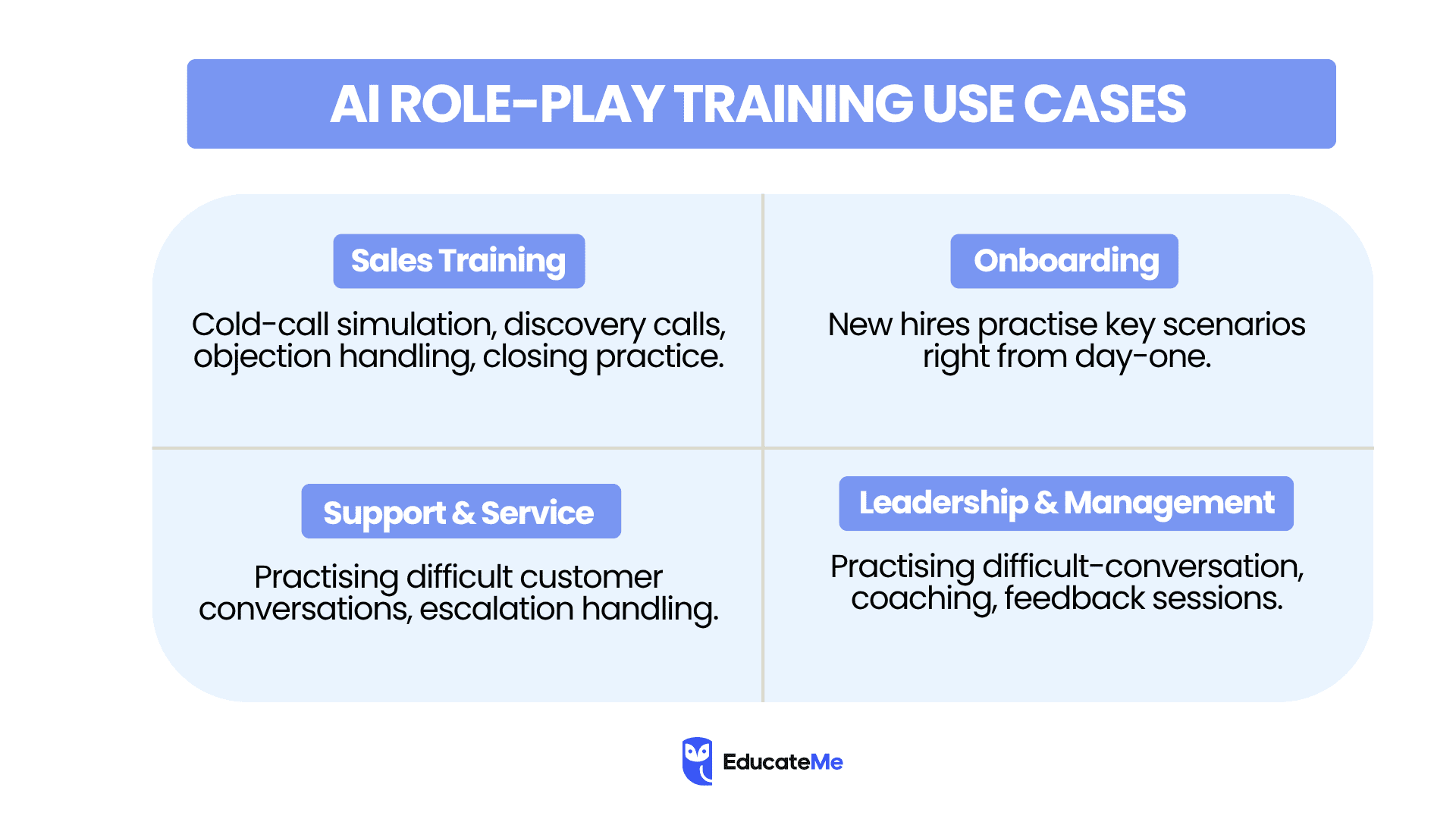
- Sales training. Cold-call simulation, discovery calls, objection handling, closing practice.
- Onboarding. New hires practise key scenarios right from day-one.
- Support & service. Practising difficult customer conversations, escalation handling.
- Leadership & management. Practising difficult-conversation, coaching, feedback sessions.
- Compliance / medical / safety. High-stakes situations where mistakes are costly; simulation helps practise without risk.
- Soft-skills / cross-functional. Negotiation, persuasion, presentation, interview skills.
Business Value & Stakeholder Benefits
Why should stakeholders (L&D heads, training managers, sales enablement leads, learning & development executives) care about AI role-play training tools? Let’s explore the value proposition clearly.
For the business/organization
- Faster ramp-up time. New hires can get up to speed quickly because they practice realistic scenarios rather than just passively learn.
- Improved performance/outcomes. Better conversation skills lead to higher win rates, larger deal sizes, and improved customer satisfaction.
- Cost savings. Fewer facilitator hours, less scheduling overhead, less travel for in-person role-play, fewer mistakes in the field.
- Scale & consistency. All learners get the same high-quality of practice and feedback; global teams can practice with the same standard.
- Data & governance. Tracking training effectiveness, coaching gaps, skill-deficiencies, and providing evidence of ROI for L&D.
- Better learner engagement. Role-plays tend to be more immersive and “real” than standard e-learning, increasing knowledge retention and behavior change.
For training managers / L&D leads
- On-demand practice. Learners practice when convenient; less dependency on scheduling large groups.
- Automated feedback. Free up trainers/facilitators from basic practice sessions; they can focus on high-value coaching.
- Scenario flexibility. Tailor to industry, region, language, and role (sales, support, leadership) easily.
- Monitoring & analytics. See who is practicing, their scores/trends, and target coaching where needed.
- Integration with LMS/workflows. Combine role-play with onboarding modules, compliance training, and certification pathways.
For learners (sales reps, support agents, managers)
- Safe practice space. No risk of messing up with a real customer.
- Instant feedback. Get feedback immediately rather than waiting for a coach.
- Repeatable practice. Try again until you feel confident; can do micro-sessions on the go.
- Realistic simulation. Doesn’t feel like a quiz but a conversation; builds confidence.
- Accessible anytime, anywhere. Learners can practice remotely, on mobile, and asynchronous.
Top 5 AI Role-Play Training Software
Here are five standout platforms in the AI role-play training space. For each, I’ll give a friendly overview, key strengths, and a few notes.
EducateMe - AI Coaching Roleplay for Corporate Training
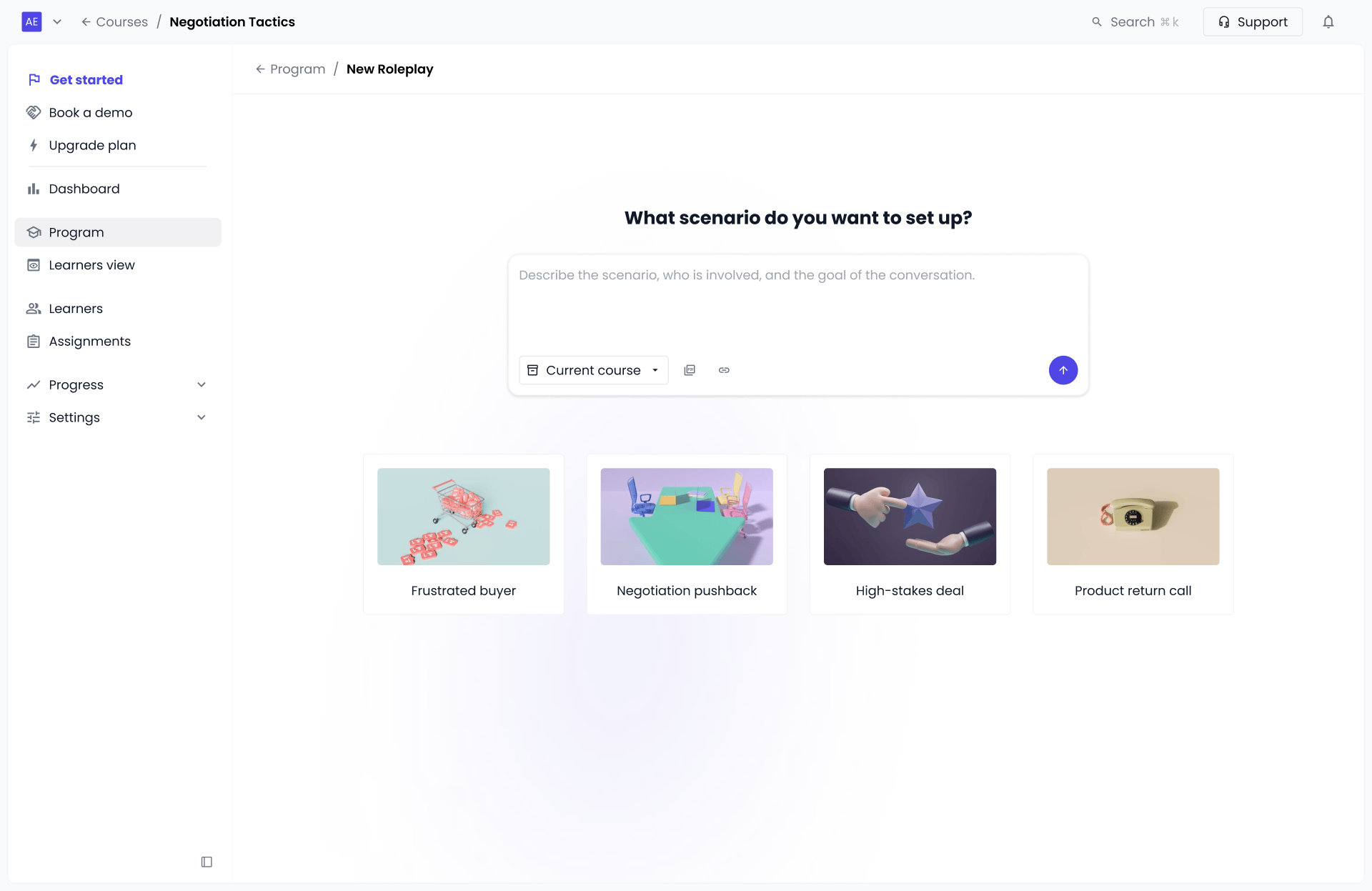
EducateMe offers a great combination: an LMS + AI role-play coach built into the training ecosystem. The big advantage is that you can run not only highly customisable AI role-plays, but you can build the full training journey (course → practise → analytics) in one system.

Key features
- Create role-play scenarios with an AI generator from a single prompt.
- Customise industry- and use-case-specific scenarios.
- Share across learner groups, manage securely.
- Personal feedback to learners and dashboards for training managers.
- 24/7 availability means learners can practise anytime.
- The platform also supports assignments, analytics, integrations, and custom branding.
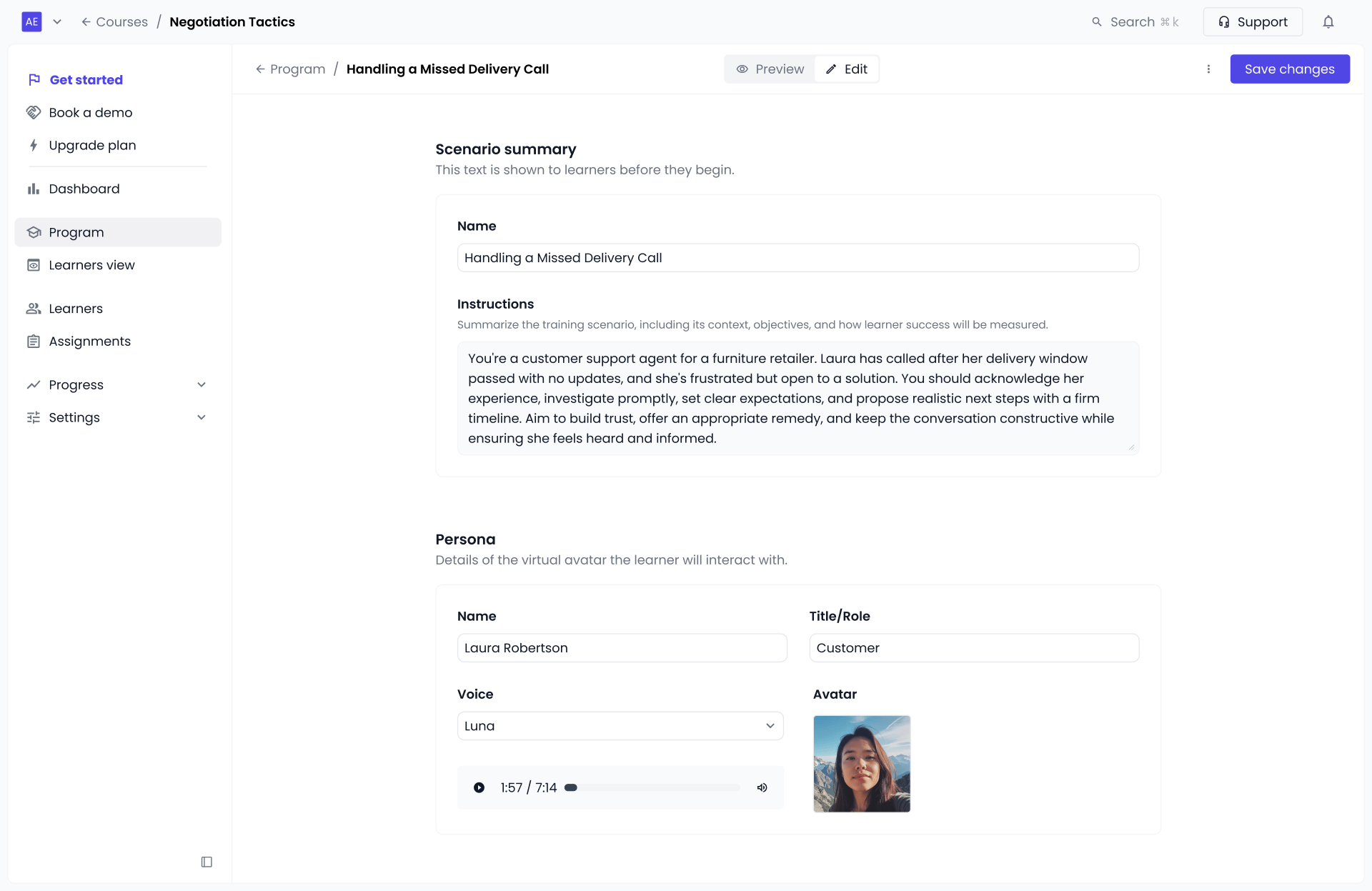
Why you might choose it
- Single integrated LMS + role-play environment
- Good pricing transparency
- Strong customisation, industry adaptability
- Scalable for large teams, yet accessible for smaller groups
Pricing: 50 sessions → US$175 (one-time purchase, for example
Mindtickle - Role Play Sales Training Solution
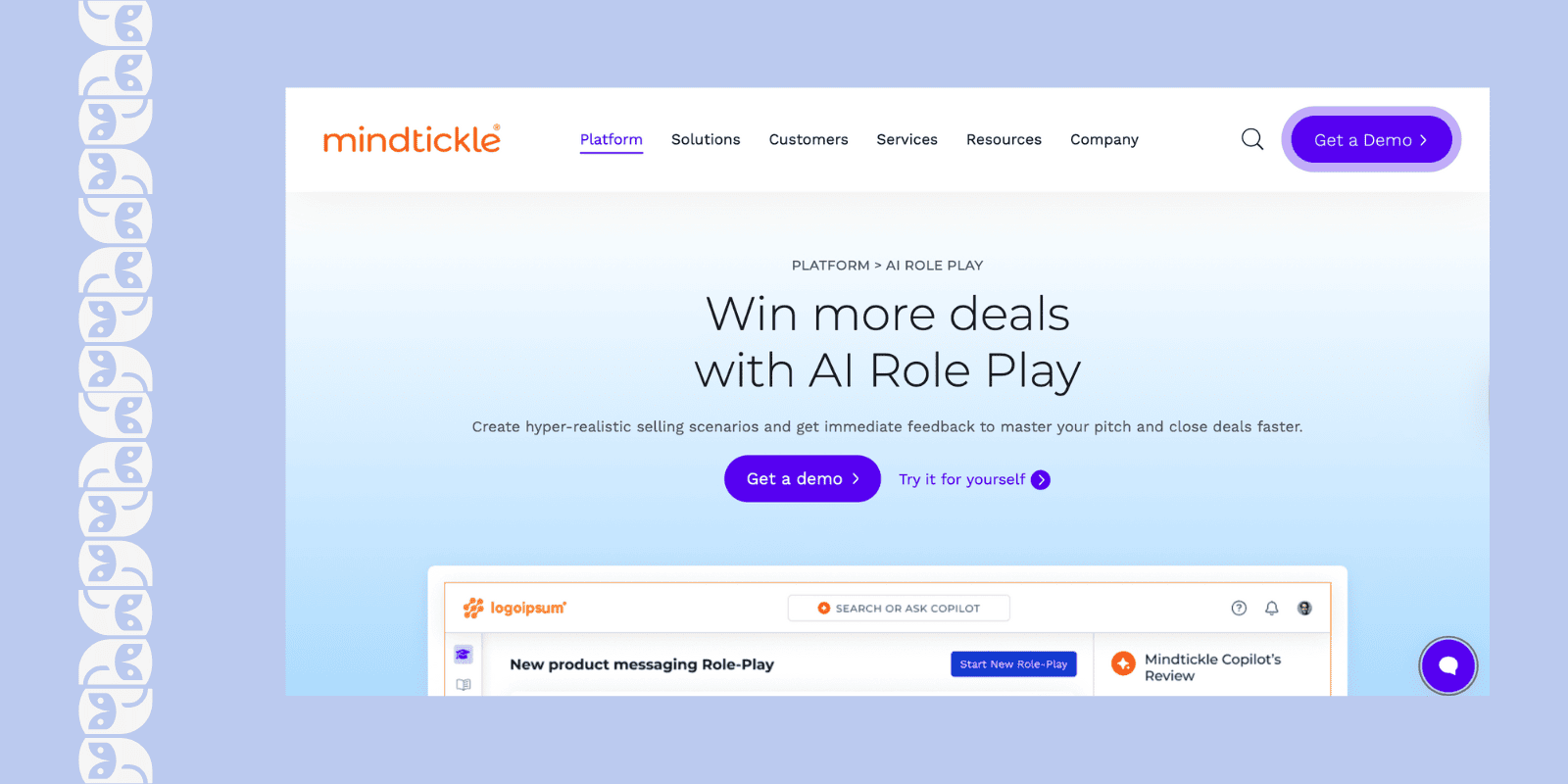
Mindtickle is one of the pioneers in role play sales training and revenue readiness. Its AI Role Plays are part of a broader training ecosystem that helps go-to-market teams practise customer conversations, improve performance, and ramp up faster. It’s a favourite among enterprise-scale organisations that want consistency and measurable sales impact.
Key features
- Create AI-driven role-plays for sales calls, demos, and objection handling.
- Customise scenarios by team, region, or product line for realistic training.
- Track performance through detailed dashboards and skill analytics.
- Access strong integrations with CRM and LMS systems.
- Trusted by global enterprises such as Cisco for large-scale enablement.
Why you might choose it
- Ideal for enterprise-level sales organisations.
- Proven ROI – customers report higher deal sizes and faster onboarding.
- Robust reporting and analytics capabilities.
- Advanced customisation for complex sales teams.
Pricing: Custom quotes based on user volume and enterprise needs.
SecondNature – AI Sales Role-Play
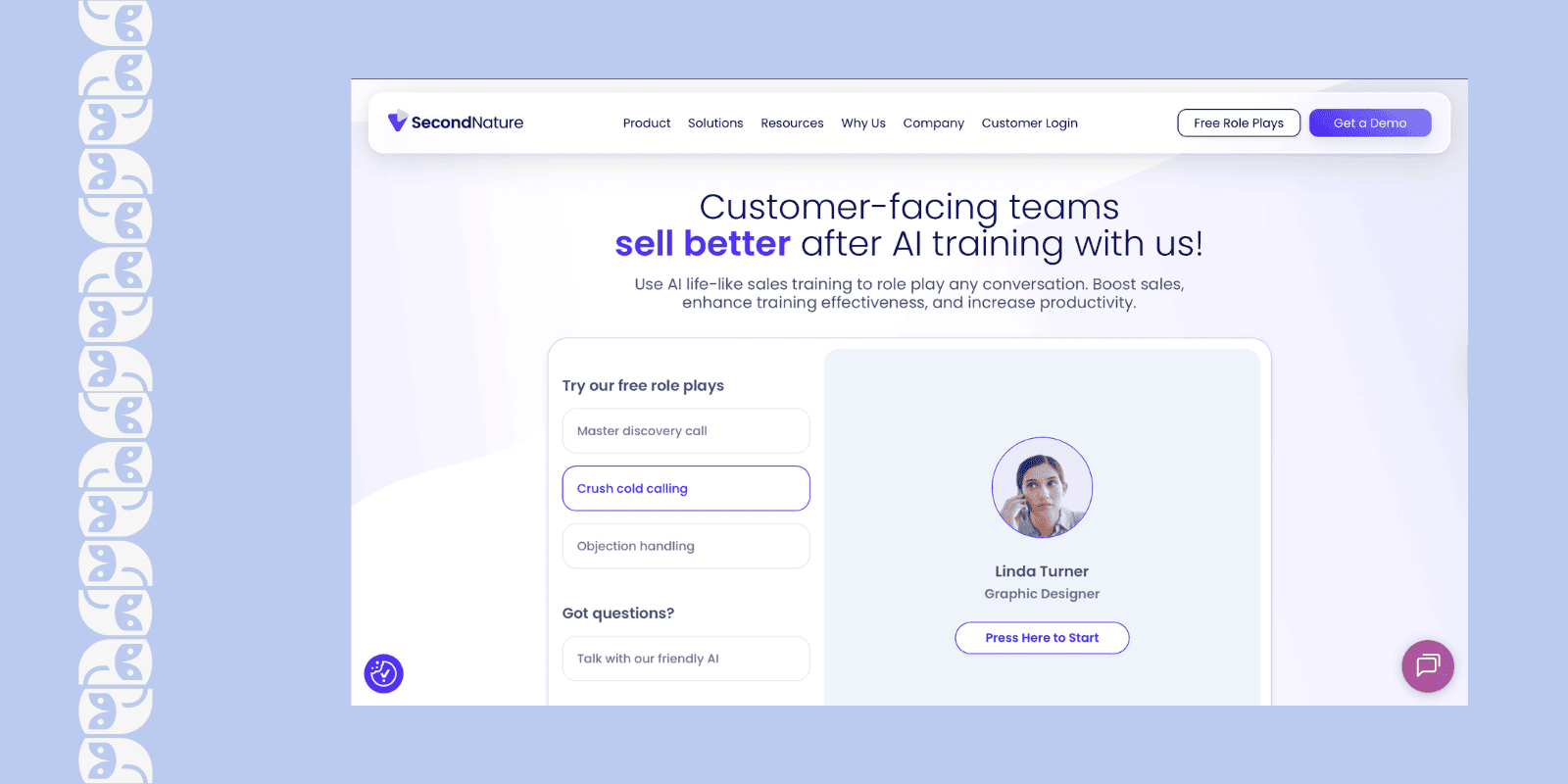
SecondNature provides life-like AI role-play simulations designed to help salespeople practise real-world conversations with a virtual customer. Its strength lies in replicating authentic human dialogue, so learners can refine discovery, pitch, and closing skills in a safe, engaging space.
Key features
- Realistic AI conversations that adapt to tone and intent in real time.
- Upload company materials (sales decks, recordings, or scripts) to build custom scenarios.
- Immediate feedback with transcript analysis and scoring.
- Multiple persona options that mimic diverse customer types.
- Cloud-based platform with easy onboarding for distributed teams.
Why you might choose it
- Focused purely on improving sales conversation skills.
- Highly immersive and engaging for reps.
- Perfect for GTM teams looking for practical, scenario-based learning.
- Easy to deploy without a complex setup.
Pricing: Available on request; typically mid- to high-tier enterprise pricing.
Hyperbound – AI Roleplays for Manager Training
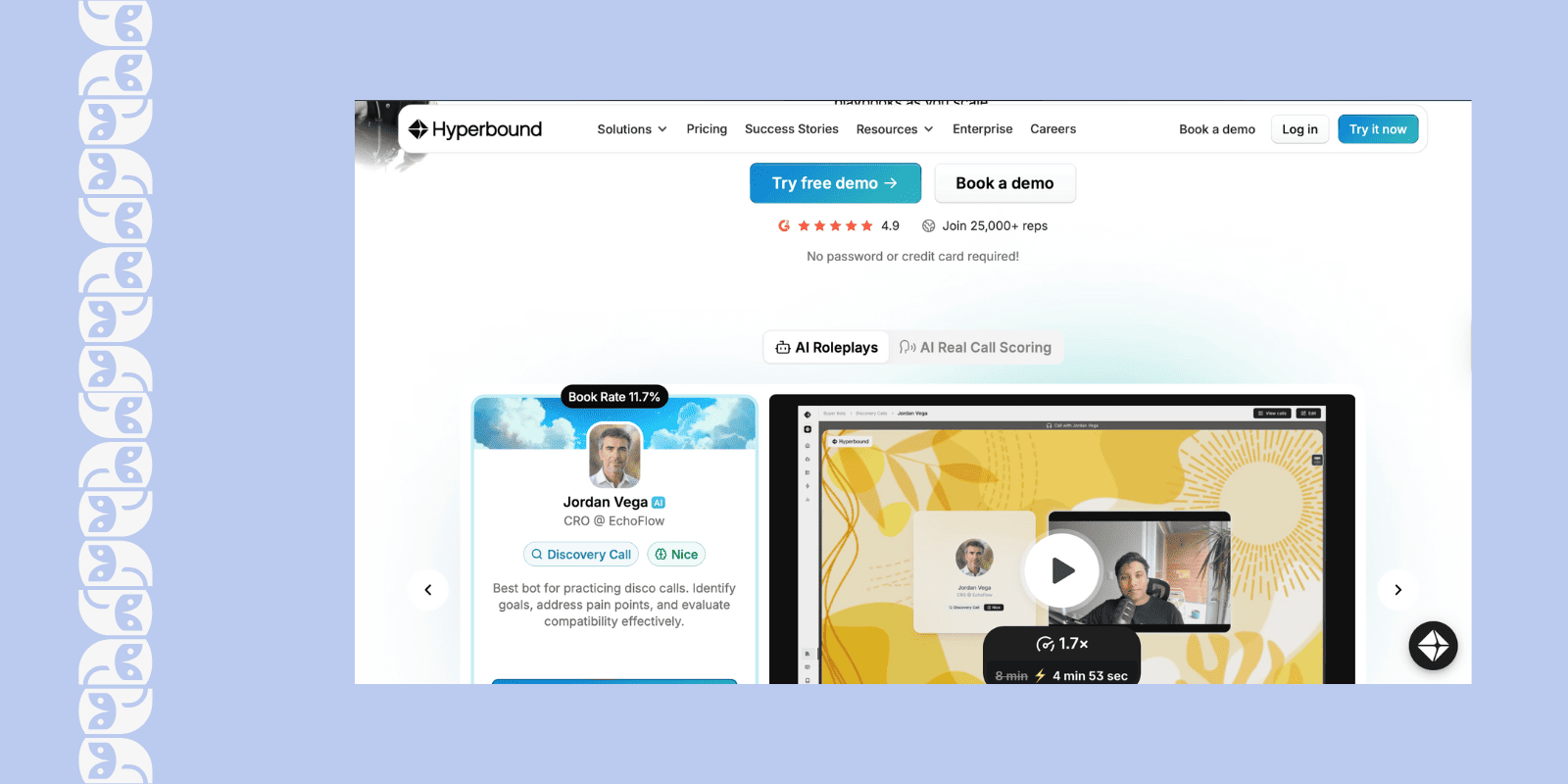
Hyperbound uses a data-driven approach to build AI role-plays based on your best sales reps’ real calls. This means your training reflects proven, high-performing behaviour, helping teams replicate success across the organisation quickly and effectively.
Key features
- Automatically analyses top performers’ calls and turns them into AI simulations.
- Personalised feedback aligned to your team’s best practices and KPIs.
- Enables continuous skill development through repeatable practice.
- Quick scenario creation using real conversation data.
- Integrates with existing enablement and call-recording systems.
Why you might choose it
- Great for scaling what already works in your sales team.
- Data-backed training tailored to company-specific success models.
- Strong fit for mid-market and fast-scaling sales organisations.
- Focused on behaviour replication, not just scripted scenarios.
Pricing: Custom plans depending on data integration and user size.
Yoodli – Interactive AI Roleplay Training for Onboarding
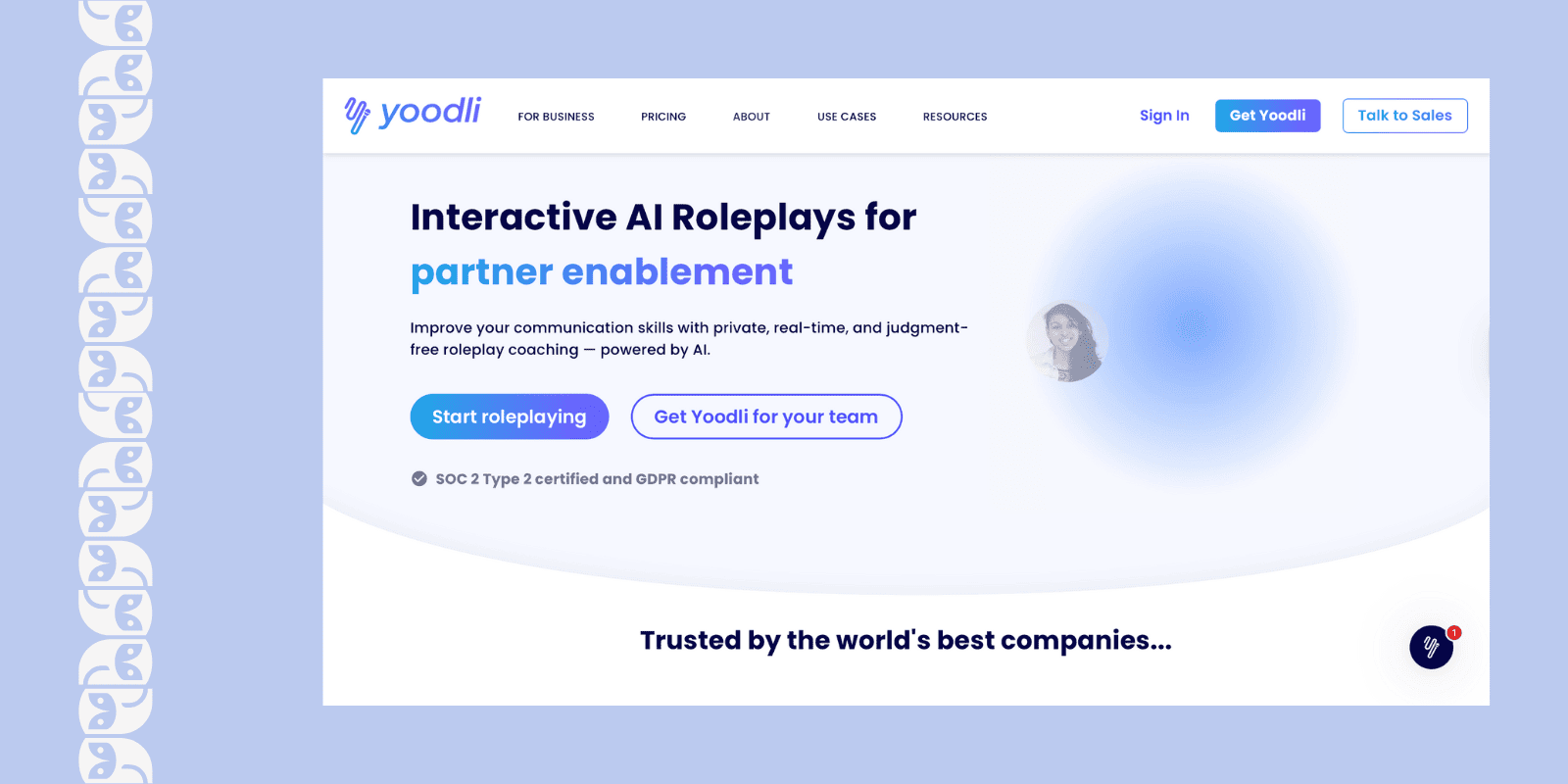
Yoodli focuses on AI-powered communication and leadership training, helping users improve speaking, presentation, and coaching skills. It’s not limited to sales – instead, it targets broader soft-skill development across the entire organisation.
Key features
- Real-time speech feedback on tone, clarity, pacing, and filler words.
- Ready-to-use AI coaches for interviews, presentations, and leadership conversations.
- Integrates with corporate coaching systems and LMS platforms.
- Powers the Sandler AI Roleplay Coach, proving its adaptability for enterprise use.
- User-friendly, gamified experience that encourages continuous practice.
Why you might choose it
- Ideal for developing communication and leadership skills company-wide.
- Suitable for both individuals and corporate teams.
- Great for soft-skills, presentation, and public-speaking training.
- Fast setup and intuitive design for easy adoption.
Pricing: Free and paid tiers for individuals; enterprise packages available on request.
The Final Thought
AI role-play training has turned traditional practice into something scalable, realistic, and measurable. Where old-school role-plays relied on scheduling and human facilitators, AI role-play training software lets learners practice anytime, get instant feedback, and improve continuously – no waiting, no limits.
EducateMe AI Roleplay Coach stands out because it unites a powerful LMS with an adaptive AI coach. You can build, customize, and track every scenario in one place – perfect for organisations that want training that’s both personal and automated.
Our top picks
Corporate

EducateMe AI Role Play
EducateMe offers a great combination: an LMS + AI role-play coach built into the training ecosystem.
Try EducateMe for freeSales Enablement

Mindtickle
AI-powered sales training LMS that closes skill gaps in real time, reinforces learning, and drives consistent sales success.
Try EducateMe for freeB2B Sales

SecondNature
Life-like AI role-play simulations designed to help salespeople practise real-world conversations.
Try EducateMe for free





















